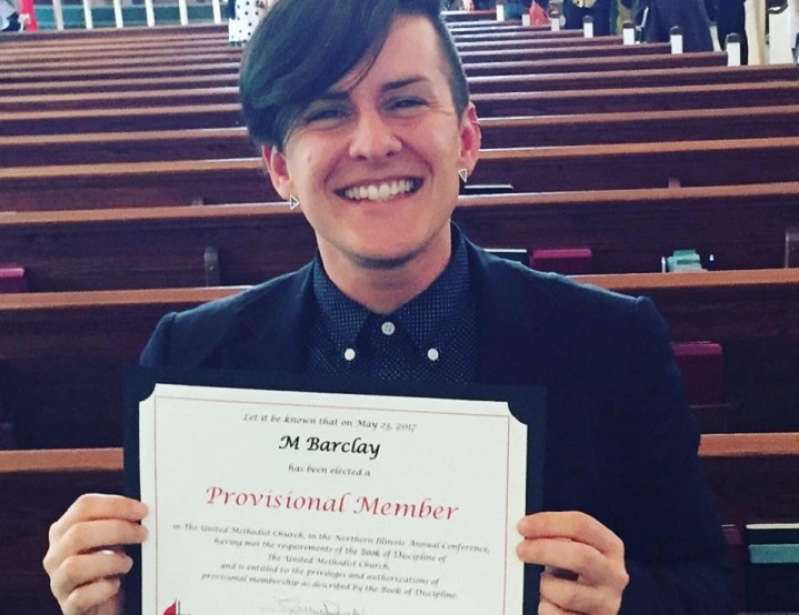
The Northern Illinois Conference of the United Methodist Church ordained an openly non-binary transgender as a provisional deacon.
M Barclay, who serves as director of communications for the unofficial UMC group Reconciling Ministries Network that advocates for the inclusion of LGBTQ persons "in all aspects of church life," was ordained at the Ordination and Commissioning Service held on June 4, according to a news report from the UMC.
While there have been other transgender persons previously ordained as deacons in the UMC, Barclay is the first non-binary transgender person ordained as deacon in the church.
Non-binary transgender persons are gender neutral. They identify as neither male nor female, meaning their identities fall outside the gender binary. They are also referred to as "genderqueer," although the term "non-binary" is often preferred.
Because a person who identifies as non-binary is neither male nor female, he or she uses the pronoun "them" to refer to himself or herself. Thus, this is how the bishop who ordained Barclay addressed her during the ceremony.
"Pour out your Holy Spirit upon M. Send them now to proclaim the good news of Jesus Christ, to announce the reign of God and to equip the church for ministry," the bishop said, according to The Washington Post.
Bishop Sally Dyck of the Northern Illinois Conference expressed support for Barclay's ordination as provisional deacon and said she hopes the church will someday come to full inclusion of LGBTQ members.
"While M's journey over the last few years has included gender identity, all of those who were commissioned or ordained on Sunday have been on some kind of journey that has brought them to new places of faith, life and relationships," Dyck said in a statement.
"Likewise, I hope the church will find itself at a new place in the near future when it comes to full inclusion," she said. "That said, M and the other candidates for commissioning and ordination are all a part of the church's witness and outreach to people who need the good news of Jesus Christ."
The Northern Illinois Conference openly goes against the UMC's stance on ordaining LGBT persons into the clergy.
Barclay, who used to carry the name Mary Ann Kaiser, was certified as a deacon candidate in 2008 in the Alabama-West Florida Annual Conference. After that time, she moved to the Southwest Texas Conference and studied at the Austin Presbyterian Theological Seminary, where she completed a degree in Master of Divinity.
On April 2013, she announced she was homosexual, but this did not stop the district committee from recommending her for ordination. However, on June 2013, she was blocked from the ordination process by the board of ordained ministry because of her sexual orientation.
On December 2013, San Antonio Area Bishop James E. Dorff reversed the previous decision to remove her as clergy candidate. Dorff said Barclay could proceed with the full examination and the interview process.
On May of the following year, she was interviewed by the Board of Ordained Ministry of the United Methodist Southwest Texas Annual (regional) Conference, only to be rejected once more.
In 2014, Barclay announced she was transitioning into the non-binary gender.
Last year, the Northern Illinois Conference's board of ordained ministry announced it did not consider sexual orientation and gender identity in evaluating candidates for clergy.
On May 23, 2017, the board said it would continue to abide by the church's Book of Discipline in interviewing candidates. Less than two weeks later, Barclay was ordained as provisional deacon.
Barclay said she had been waiting a long time to "be a pastoral presence in the world."
"For so long, I've longed to be a pastoral presence in the world — and certainly you can do that without a collar — but we have ordination for a reason, and part of that is that I can publicly identify as a pastor now," Barclay said.
"I know it's not particularly common in The United Methodist Church, but I intend to wear a collar every single day because for a person like me to navigate society in a collar provides some profound and urgently needed pastoral opportunities, particularly for queer and trans people."
The UMC's Book of Discipline recognizes that every person is of sacred worth but says that homosexuality is "incompatible with Christian teaching" and prohibits openly practicing homosexuals from being ordained into the clergy.
"Self-avowed practicing homosexuals are not to be certified as candidates, ordained as ministers, or appointed to serve in The United Methodist Church," the Book of Discipline states.
On April, UMC's highest court, the Judicial Council, ruled that the consecration of openly gay bishop Karen Oliveto is a violation of church law and considered as a chargeable offense. However, it clarified that this ruling does not mean she is no longer a bishop, but her office will be subject to review.






